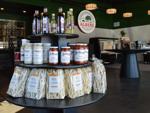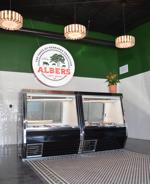So what are you supposed to make when life gives you 17,000 pounds of boxed beef?
As Blake Albers found out, you make a deal and launch a new business.
The 34-year-old entrepreneur has encountered many such pitfalls on his journey to find his niche in the meat market. All of these experiences culminated in October when he and his wife Brittany officially opened Albers Craft Meats in Norfolk, Nebraska.

Blake Albers has launched a new meat processing facility and distribution center in Norfolk, Neb., called Albers Craft Meats: A Taste of Nebraska Tradition. Photo by Timothy Metcalf Photography and courtesy of Albers Craft Meats
A U.S. Department of Agriculture-inspected meat processing facility and distribution center, Albers Craft Meats assists customers in adding value to premium beef products while also offering signature products directly to consumers both locally and nationally.
Originally from Wisner, Nebraska, Albers is among the fifth generation to be involved in the Herb Albers Feedlot located in the northwestern corner of Cuming County. Most of the family is involved in the business in one way or another, said Albers. He knew that diversification was necessary to continue his involvement in the family business long term.
“We’re a successful family farm, but generationally more and more people are involved, all capable of running the feedlot. My solution was to add another branch to the tree,” Albers said.
After graduating from the University of Nebraska-Lincoln with a degree in agriculture economics, Albers applied his skill in livestock marketing to develop an export program. By 2017, he had assembled what he considered at the time to be his “dream team.”
“We worked together with a logistics company in the United States that owned a portion of a trucking company and distribution center in Shanghai,” Albers said.
It was at this point in his budding, albeit short-lived, export career that life hurled Albers with a load of lemons. An order of boxed beef that was ready for export canceled the night before delivery. He had to find a market for approximately 8.5 tons of beef, and fast.

Customers can purchase meat products in bulk or select from specialty items at the newly-opened Albers Craft Meats storefront in Norfolk, Neb. Midwest Messenger photo by Kristen Sindelar
"I had to learn how to move beef,” said Albers.
He connected with a third-party processor who could cut the meat into steaks, creating a value-added product that was also in high demand.
“This event kicked us into a higher volume program and took us from processing a few head at the local locker to 20 to 60 head kills,” Albers said.
As demand for the project grew, Albers found that he had less time to devote to the family’s commodity cattle feeding operation. Instead, he began working to market the end product.
The Albers family had created its own brand of direct-to-consumer beef in 2015 under the name Albers Beef. In 2018, Albers augmented the family brand by opening a brick-and-mortar storefront in downtown Norfolk to sell Albers Meat, as well as craft spirits and seafood. Lot 279 Meat and Spirits became a tasting bar, meaning that customers could sample any product before purchasing.

An old distribution warehouse was modernized into a storefront to showcase the variety of beef offered by Albers Craft Meats.Midwest Messenger photo by Kristen Sindelar
To draw people to the store when it first opened, Albers hosted taco nights and special bar tasting events. Then COVID deposited another load of lemons on his business plan. All in-person gatherings abruptly stopped as the world seemingly came to a halt.
“Shoulder-to-shoulder action was no longer feasible. It was tough,” said Albers. “We didn’t have much foot traffic then.”
Albers pushed e-commerce sales during the COVID pandemic. Throughout this time, he learned how to skillfully trade boxed beef and formed partnerships with third-party companies to further process meat.
Albers channeled all these experiences into his newest venture, Albers Craft Meats: A Taste of Nebraska Tradition.
The business is multi-faceted, marketing beef products for his own family’s brand and a handful of other family-run beef operations and companies in Nebraska and Colorado. The goal is to add value to the meat.
“We are a group of beef brands working together,” Albers said.

A new line of meat products called Prepped Proteins offers convenient and healthy options for consumers. Photo by Timothy Metcalf Photography and courtesy of Albers Craft Meats
Albers Craft Meats acts as the consultant for these companies to manage distribution of boxed beef. They also provide further fabrication and processing of the boxed beef at their newly opened facility.
“We help them navigate the meat market, further process products into craft meats and put their products into high-quality packaging,” said Albers.
Albers Craft Meats is located in southern Norfolk. The USDA-inspected facility was formerly a beer distribution warehouse; the site proved to be the perfect “blank slate” for Albers to build a mini meat processing plant in modules. The warehouse was renovated into a 3,500-square-foot area for retail sales and offices, a 2,400-square-foot space for meat cutting and packaging and a 4,500-square-foot cooler. There are 10 employees.
Albers found that adding value to the products is necessary to move large volumes of beef, saying that you have to “balance the carcass” because not all of the meat can be premium New York strip steaks or tenderloin filet. He added, “Nobody wants three cases of inside round, either.”
“The challenge is that when an animal is completely portioned out, it will only provide 75 pounds of true-blue steakhouse cuts,” said Albers.
One way Albers Craft Meats is adding value is by simply combining forces to create large volume. For example, multiple customers may put together trim products to fulfill a 30,000 order.
“One you break the volume barrier, you have more ability to trade,” said Albers.
Further processing meat cuts can also increase value. Processing does not mean “ultraprocessed” but rather using techniques such as smoking meat to add flavor or marinating to tenderize the meat. Albers explained that by marinating and packaging a sirloin tip steak, a normally tough piece of low-priced meat can be sold as a highly desired 6 oz. breakfast steak. Or the naval plate of the beef can be cured into beef bacon instead of being ground with other trim.
Albers is helping his customers become “price makers” instead of “price takers.”
“As cattlemen, whether or not we like the market price, we always have readily available markets to sell a fat steer,” said Albers. “When you become a price maker, you retail items direct to consumer or resale. You’re pushing uphill, but you run a less commodity-impacted business.”
Albers Craft Meats has also introduced a new line called Prepped Proteins. Available at the store or shipped directly to your home, the 6-ounce packaged meat products are smoked at Albers Craft Meats and ready-to-eat. Just like the other products from Albers Craft Meats, they are made with simple ingredients.
Throughout his journey marred by unfulfilled trade deals and an unforeseen pandemic, Albers has employed innovative marketing strategies to make lemons into lemonade. He is continuing his family’s legacy and offering consumers “a taste of Nebraska tradition” through Albers Craft Meats.
Shop for premium quality meats athttps://alberscraftmeats.com/.
Reporter Kristen Sindelar has loved agriculture her entire life, coming from a diversified farm with three generations working side-by-side in northeastern Nebraska. Reach her atKristen.Sindelar@midwestmessenger.com.












